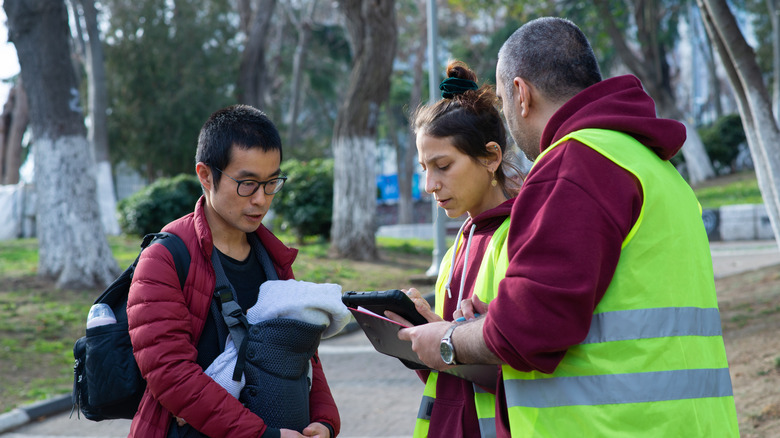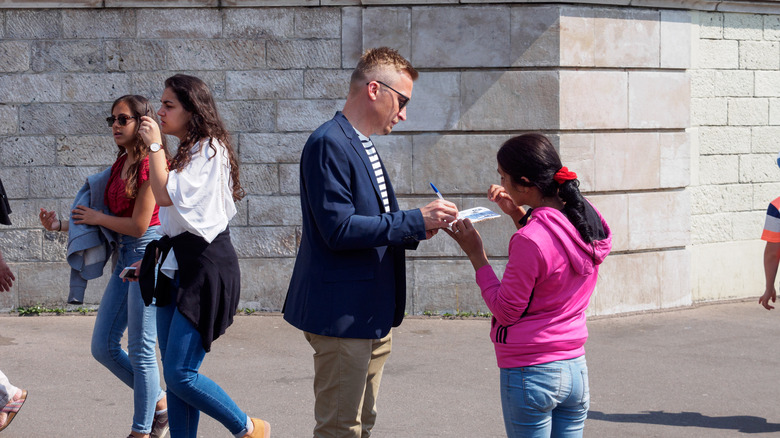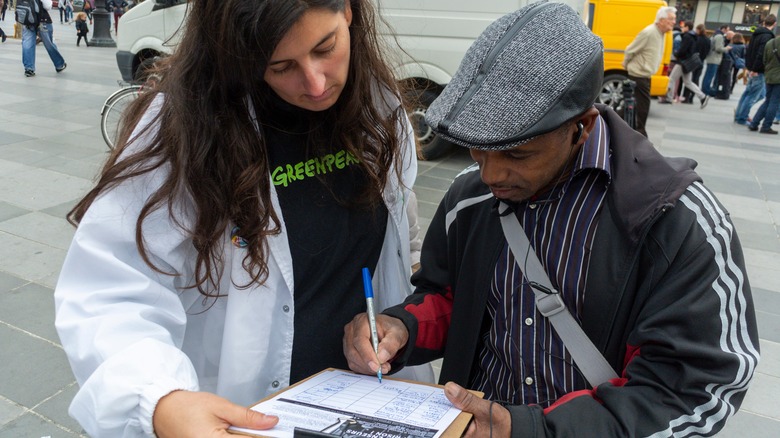The Upsetting 'Petition' Scam Travelers Should Beware Of, According To Rick Steves
Signing a petition for a great cause can make us feel good about ourselves. While you're on vacation and enjoying some time away from everyday cares, you might be feeling more generous than usual, possibly even willing to sign a petition if someone asks on the street. However, travel pro Rick Steves explains on his website that this may well be a scam.
"You're at a popular sight when someone thrusts a petition at you," he says. "This person, sometimes pretending to be deaf, tries to get you to sign an official-looking petition, supposedly in support of a charity (the petition is often in English, which should be a clue)." Steves says the next step is this person asking for a cash donation, and this scam can also lead to you being the victim of pickpocketing, as you'll be distracted while speaking to the person with the petition.
A request for a signature and cash might be the end of it, but the scammer may also have fake documentation to "prove" that this is a legitimate charity or cause, making you more likely to sign. There are plenty of scams out there to trap unsuspecting tourists, like the costumed gladiator photo at Rome's Colosseum, friendship bracelet scam, and fake taxis that should be easy to spot but can cost you a lot of money. If you know about these before you travel, you have a better chance of avoiding them.
Different ways the charity scam works
The petition scam may present simply, with a person holding a clipboard and a pen, and maybe a small sign. These scam artists are looking for people with a good nature, and anyone can be vulnerable. Steves says, "Many of the most successful gambits require a naive and trusting tourist. But it can happen to more sophisticated travelers, too." Lots of us want to help a good cause, as it makes us feel like we're doing something beneficial for the world, even in a small way. We'll talk about how to do this the right way, but it's important to be able to recognize this scam in all its forms.
Steves says some scammers dress in a suit, so they look trustworthy. Or, they may have a small child with them and ask you to hold that child while they get the petition ready. Distraction makes you a target for a pickpocket, Steves cautions. Additionally, these scams often ramp up around the holidays. If you're taking a trip to see the Christmas decorations in Paris, for example, you might be feeling extra generous, and get caught up in the spirit without thinking about the dangers.
How to protect yourself and sign petitions responsibly
Some petitions only require a signature, but others may ask you for personal information like phone numbers and addresses. Don't give it to them. If you encounter this scam in America and the person asks for donations, you can check out a website called Charity Watch so you can see whether the charity is real. If it is, you can donate through the site after you're home and have done some research. Even if you choose to sign or donate on the spot, ask if they have a receipt for tax deductions. If it's a scam, they probably won't, though even those can be faked. That's true for websites as well, and while you're using your phone to look it up, someone's hand may be in your backpack.
It might feel uncomfortable to say no to someone who is asking for a petition signature, donation, or anything else — no one wants to feel like a heel. Holding up a hand with a smile and moving on can work, as can a simple "No, thank you" with the same smile. One Reddit user suggested something like saying, "Sorry I'm late," and continuing on. If they make you feel bad, you might think you have to explain why you're not signing, but don't. Any opening or conversation is another chance to convince you or refute your excuse. Don't engage with them and just move on.


